Hyundai i10 VS BMW i5 – Specs, Efficiency & Price Comparison
Which model is the better choice – the Hyundai i10 or the BMW i5? We compare performance (90 HP vs 601 HP), boot capacity (252 L vs 490 L), efficiency (4.90 L vs 15.90 kWh), and of course, the price (14600 £ vs 60200 £).
Find out now which car fits your needs better!
The Hyundai i10 (Hatchback) is powered by a Petrol engine and comes with a Manuel or Automatic transmission. In comparison, the BMW i5 (Sedan) features a Electric engine and a Automatic gearbox.
When it comes to boot capacity, the Hyundai i10 offers 252 L, while the BMW i5 provides 490 L – depending on what matters most to you. If you’re looking for more power, you’ll need to decide whether the 90 HP of the Hyundai i10 or the 601 HP of the BMW i5 suits your needs better.
There are also differences in efficiency: 4.90 L vs 15.90 kWh. In terms of price, the Hyundai i10 starts at 14600 £, while the BMW i5 is available from 60200 £.
Compare all the key specs now and find out which model fits your lifestyle best!
Hyundai i10
The Hyundai i10 impresses with its compact design, making it an ideal choice for navigating through busy urban environments. Its interior is surprisingly spacious, offering drivers and passengers comfort beyond what one might expect from a city car. The model combines efficiency and practicality, making it an attractive option for those seeking both economy and functionality in their daily commute.
details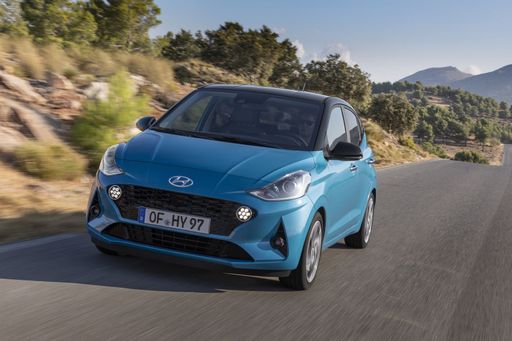 @ hyundai.news
@ hyundai.news
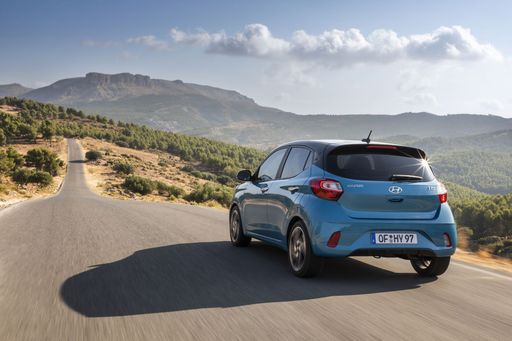 @ hyundai.news
@ hyundai.news
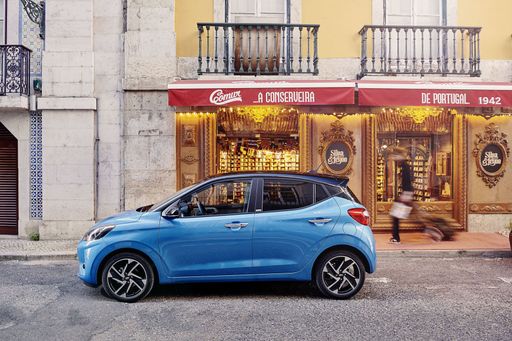 @ hyundai.news
@ hyundai.news
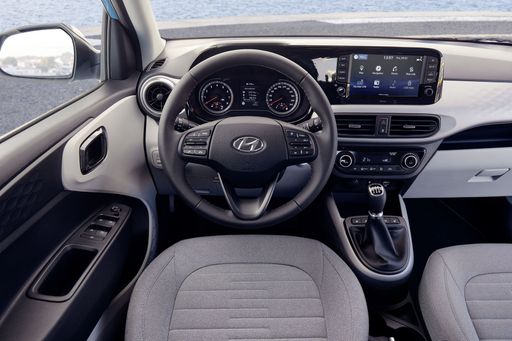 @ hyundai.news
@ hyundai.news
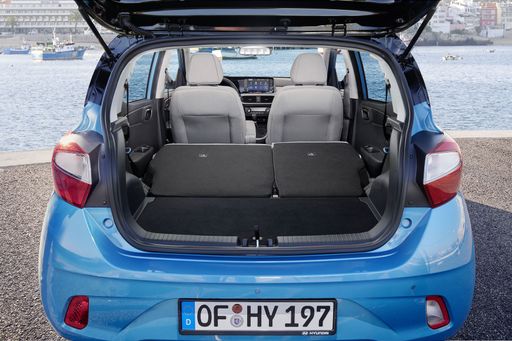 @ hyundai.news
@ hyundai.news
BMW i5
The sleek new i5 captivates drivers with its striking design and innovative features that blend luxury and efficiency. Inside, the spacious cabin boasts cutting-edge technology, ensuring a connected and comfortable ride for all passengers. Whether navigating city streets or embarking on a weekend getaway, the i5 delivers a dynamic driving experience that is sure to impress.
details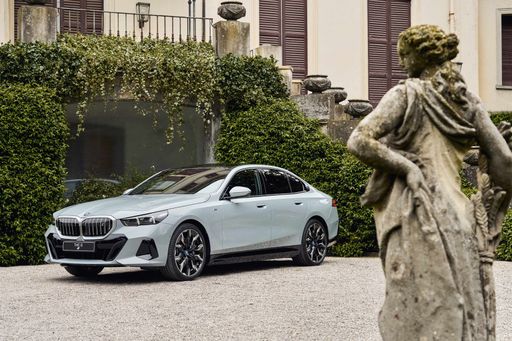 @ BMW
@ BMW
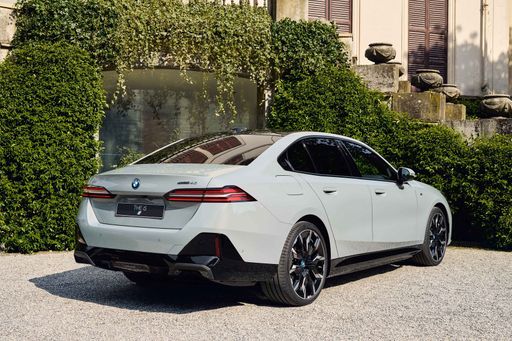 @ BMW
@ BMW
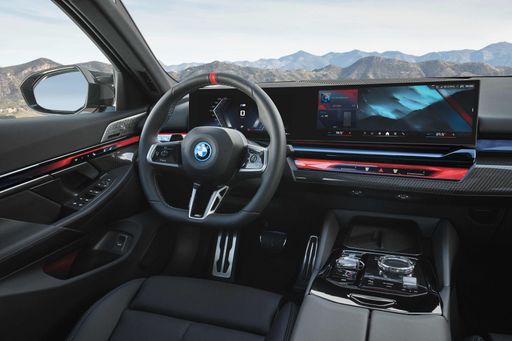 @ BMW
@ BMW

|

|
|
|
|
Costs and Consumption |
|
|---|---|
|
Price
14600 - 19000 £
|
Price
60200 - 85300 £
|
|
Consumption L/100km
4.9 - 5.4 L
|
Consumption L/100km
-
|
|
Consumption kWh/100km
-
|
Consumption kWh/100km
15.9 - 18.4 kWh
|
|
Electric Range
-
|
Electric Range
511 - 582 km
|
|
Battery Capacity
-
|
Battery Capacity
81.20 kWh
|
|
co2
111 - 123 g/km
|
co2
0 g/km
|
|
Fuel tank capacity
36 L
|
Fuel tank capacity
-
|
Dimensions and Body |
|
|---|---|
|
Body Type
Hatchback
|
Body Type
Sedan
|
|
Seats
4 - 5
|
Seats
5
|
|
Doors
5
|
Doors
4
|
|
Curb weight
996 - 1099 kg
|
Curb weight
2205 - 2380 kg
|
|
Trunk capacity
252 L
|
Trunk capacity
490 L
|
|
Length
3670 - 3675 mm
|
Length
5060 mm
|
|
Width
1680 mm
|
Width
1900 mm
|
|
Height
1480 - 1483 mm
|
Height
1505 - 1515 mm
|
|
Payload
344 - 423 kg
|
Payload
515 - 535 kg
|
Engine and Performance |
|
|---|---|
|
Engine Type
Petrol
|
Engine Type
Electric
|
|
Transmission
Manuel, Automatic
|
Transmission
Automatic
|
|
Transmission Detail
Manual Gearbox, Automated Manual
|
Transmission Detail
Reduction Gearbox
|
|
Drive Type
Front-Wheel Drive
|
Drive Type
Rear-Wheel Drive, All-Wheel Drive
|
|
Power HP
63 - 90 HP
|
Power HP
340 - 601 HP
|
|
Acceleration 0-100km/h
11.4 - 18.4 s
|
Acceleration 0-100km/h
3.8 - 6 s
|
|
Max Speed
143 - 175 km/h
|
Max Speed
193 - 230 km/h
|
|
Torque
93 - 172 Nm
|
Torque
430 - 820 Nm
|
|
Number of Cylinders
3 - 4
|
Number of Cylinders
-
|
|
Power kW
46 - 66 kW
|
Power kW
250 - 442 kW
|
|
Engine capacity
998 - 1197 cm3
|
Engine capacity
-
|
General |
|
|---|---|
|
Model Year
2024
|
Model Year
2023 - 2024
|
|
CO2 Efficiency Class
C, D
|
CO2 Efficiency Class
A
|
|
Brand
Hyundai
|
Brand
BMW
|
Hyundai i10
Introduction to the Hyundai i10
The Hyundai i10 has consistently proven to be a dependable and stylish companion for urban driving. Known for its compact design and efficiency, this hatchback offers a perfect blend of modern aesthetics and practicality, making it a popular choice for city dwellers and small families alike.
Performance and Efficiency
The Hyundai i10 is available with both manual and automatic transmissions, catering to various driving preferences. Engine power ranges from 63 to 90 PS, providing a versatile driving experience for both novice and seasoned drivers. The fuel consumption varies between an impressive 4.9 to 5.4 litres per 100 kilometres, fitting for those looking to minimise fuel costs while also reducing their carbon footprint.
Engine and Transmission
Equipped with a choice of 1.0-litre or 1.2-litre engines, the i10 offers up to 172 Nm of torque, ensuring lively performance. The models feature front-wheel-drive configurations, allowing for smooth handling and reliable road performance. The car excels in city driving but is equally capable on longer journeys.
Interior and Comfort
Despite its compact size, the Hyundai i10 does not compromise on interior space and comfort. It accommodates four to five occupants comfortably, offering sufficient legroom and headroom. Its flexible seating arrangement and a 252-litre boot make it ideal for both quick trips and weekend getaways.
Safety and Technology
Safety remains a priority with Hyundai, and the i10 is no exception. It comes equipped with multiple airbags, stability control, and advanced braking systems. Technology-wise, the i10 features a user-friendly infotainment system with smartphone connectivity, ensuring a pleasant and connected drive.
Design and Style
The Hyundai i10’s design is both modern and sleek, making it stand out in the compact hatchback segment. With a length ranging from 3670 to 3675 mm, a width of 1680 mm, and a height of 1480 to 1483 mm, the i10 strikes a perfect balance between style and functionality.
Affordable Pricing and Value
The i10 is available in several trims including the Select, N Line, and Prime, among others, with prices ranging from €16,990 to €22,190. Considering its features and low running costs — with monthly expenses estimated between €694 to €793 — the Hyundai i10 offers substantial value for those seeking an economical yet stylish hatchback.
Conclusion
The Hyundai i10 combines efficiency, modern design, and practicality in a compact package. Whether you are seeking a reliable city car or an economical daily driver, the Hyundai i10 is a strong contender worth considering in the compact car market of 2024.
BMW i5
With a blend of luxurious design, cutting-edge technology, and impressive electric performance, the BMW i5 is set to redefine what consumers expect from an electric sedan. This new model carries on the legacy of the BMW brand while embracing an electric future with style and efficiency.
Performance and Powertrains
The BMW i5 offers a range of electric powertrains that users can choose from, ensuring there’s an option that fits every lifestyle. With the i5 eDrive40 configuration producing 340 HP from its rear-wheel-drive system, drivers can experience an exhilarating ride with a 0-100 km/h acceleration time of just 6 seconds. For those who crave even more power, the i5 xDrive40 variant boasts 394 HP and reduces the sprint to just 5.4 seconds, thanks to its all-wheel-drive capability.
At the top of the lineup, the i5 M60 presents an astonishing 601 HP and accelerates from 0 to 100 km/h in an impressive 3.8 seconds. This electrifying performance aligns perfectly with BMW’s commitment to delivering a thrilling driving experience, all while maintaining zero CO2 emissions.
Battery and Range
The i5 is equipped with an innovative battery system offering a capacity of 81.2 kWh. Depending on the variant, the vehicle provides an electric range between 511 km and 582 km, allowing for confident long-distance driving without frequent recharges. The efficiency of the different models is impressive, with energy consumption figures ranging from 15.9 kWh/100 km in the eDrive40 to 18.4 kWh/100 km in the M60 variant.
Exceptional Interior and Technology
Step inside the i5, and you’ll be greeted by a luxurious and spacious cabin designed to enhance the driving experience. With seating for five and a trunk capacity of 490 liters, the i5 combines comfort with practicality. Cutting-edge technology further elevates the driving experience with BMW's infotainment system, seamlessly integrating connectivity, navigation, and entertainment features through a high-resolution display.
Moreover, the i5 is equipped with extensive driver assistance features, ensuring maximum safety and convenience during every journey. Features like adaptive cruise control, lane-keeping assistance, and automated parking support make driving easier and more enjoyable.
Innovative Design Elements
The design of the BMW i5 embodies a modern aesthetic with its sleek sedan silhouette. Measuring 5060 mm in length, 1900 mm in width, and up to 1515 mm in height, it exudes both presence and elegance on the road. The aerodynamic shape not only enhances the vehicle’s visual appeal but also improves efficiency by reducing drag.
The inviting interior features high-quality materials and customizable ambient lighting, which creates a refined atmosphere. In addition, the innovative use of sustainable materials aligns with its eco-conscious electric nature, marking a significant step towards greener automotive manufacturing.
Pricing and Availability
The BMW i5 is available in several trims, with prices starting from €70,200 for the eDrive40 and reaching up to €99,500 for the M60 model. Each variant offers unique features and capabilities, catering to a wide range of consumer preferences and requirements.
The Future of Electric Mobility
As the automotive industry transitions towards electrification, the BMW i5 stands as a beacon of innovation and luxury. With its state-of-the-art performance capabilities, user-friendly technology, and commitment to sustainability, the i5 is not just a car—it's a statement of the future of mobility.
As electric vehicles increasingly dominate the market, the BMW i5 showcases how automakers can push the boundaries of what is possible, setting the standard for future electric sedans.
The prices and data displayed are estimates based on German list prices and may vary by country. This information is not legally binding.
